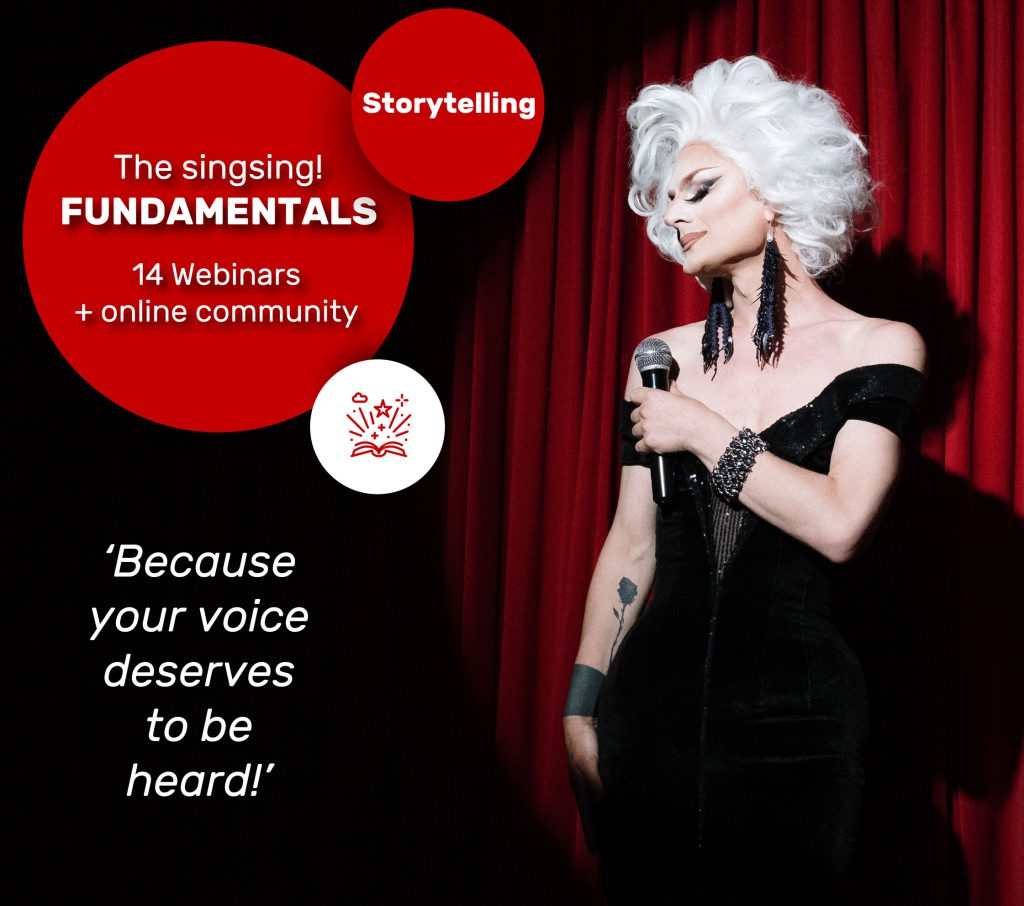
The Power of Difficult Questions - A Journey Through Storytelling Techniques
01/06/2020
When I teach 1-on-1, the lesson always starts with me asking the singer which challenge they want to tackle. And I have to admit that when they tell me they want to work on storytelling, my heart starts to dance. Yes, it is THE n°1 reason why I love to teach: I get to help you to express yourself authentically, elevating your performance to a whole new level… How cool is that?!
Many of my clients ask me “Sarah, can you please ask me the difficult questions?”. And then I know: Oooooh, this is going to be a juicy lesson!
So what do they mean by that? What are those questions? I’ve created a webinar on this topic in 2020:
Subscribe to the Library and watch the webinar on Storytelling. Witness Fiza and Haike discover how to deeply touch an audience through authentic singing.
Here are 3 techniques we’ve covered in the webinar. Start experimenting with these difficult questions right away and experience how they transform your singing!
1. How did we come to this?
Everything in life is action & reaction. When you’re acting – which is what you do when you’re singing – it is much easier to react to something than to act out of nowhere. So don’t just open your mouth and start to sing.
An engaging opening serves as a “trigger” for your character, pulling you straight into the story. A trigger can be 3 things:
- Somebody tells you something.
- Somebody asks you something.
- Something happens.
You imaging this very concrete opening happening while you walk on stage and / or during the instrumental opening of the song. The first word you sing is your reaction to what has been said, been asked or happened.
Here are some examples:
- Your best friend tells you that they’re moving back to where you live, after having lived abroad for a year.
- You want to become a parent, it hasn’t happened yet and you just broke up with your partner. Your mother doesn’t know about the break-up and asks you “When do you plan on making me a grandmother?”.
- You’re cleaning your attic and you find a box with old photographs that evoke nostalgia.
These openings will spurr raw emotions into your singing for sure!

Building this into your whole set by creating openings for every song, will help you to transition between songs smoothly. Every song is a new story, a new mini-theatre play that you step into. Engaging openings offer a fresh start with each piece by rooting you in the story, making it easier to slip into character, and genuinely connect with your audience.
2. Where are you?
You might think this is a minor detail… But do not underestimate how the location of where everything takes place affects how your story unfolds!
Imagine your character flirting in a crowded bar. Now imagine flirting on a deserted beach at sunset… Can you feel the different vibe? These nuanced settings influence your singing, gestures, and overall delivery profoundly.
Experiment with locations during your practice, and find the perfect spot for your story to develop.
3. Why is it so hard?
Another concept we discussed in the webinar was the obstacle, which adds richness to a story by introducing something that challenges your character’s desire. It forces you to try harder to attain your goal, creating tension that resonates with the audience.

For instance, we explored how a character like Jane, who wants to seduce Rob, faces the obstacle of him being married. The way you – as Jane – will sing will be heavily influenced by the fact that Rob is not open to being seduced. However, an obstacle can evolve… Rob no longer cares about his marriage by the second verse! Jane’s approach changes as she feels the obstacle disappearing, impacting your whole delivery.
This strategy allows you to add dynamic shifts to your story, making each stage of the performance resonate with real emotion and progression.
During the webinar, Haike discovered how changing her character’s situation could bring out a more vulnerable, softer side in her singing. Originally, she imagined her character was frustrated and angry, speaking to someone who wasn’t listening. Then, she switched to imagining the person was listening and willing to help her reach her goal.
This unexpected change made her character feel doubt and hesitation instead of anger, which brought out a more tender, vulnerable sound in her voice. So, rather than choosing how to sound, she let the story’s new direction guide her voice naturally.
Technique first?
While mastering vocal technique is crucial, using it in service of the story is what makes your singing compelling. As I explained in the webinar, audiences respond more to genuine emotion than perfect technique. They want to feel moved!
So, while technical skill enables you to create all the sounds you need to tell your story in a sustainable way, authenticity fuels the connection that keeps your audience engaged. When you ask yourself the difficult questions, your voice will naturally show you the colors, nuances, and effects you need to deliver a powerful, memorable performance.
Want to discover much more difficult questions?
Subscribe to the Library to watch the webinar on Storytelling and learn how to connect deeply and share your most authentic self. Keep telling your story!

Fiza - Singer & Tour guide
Fiza - Singer & Tour guide


Antoinette Thelwell - Singer, Backing vocalist & Session singer
Antoinette Thelwell - Singer, Backing vocalist & Session singer


Nele - Singer & Youth library worker
Nele - Singer & Youth library worker

As always, feel free to send me your thoughts, questions, and feedback in the comments below this blog, via the contact form or in the singsing! online community
Cordially,
Sarah


